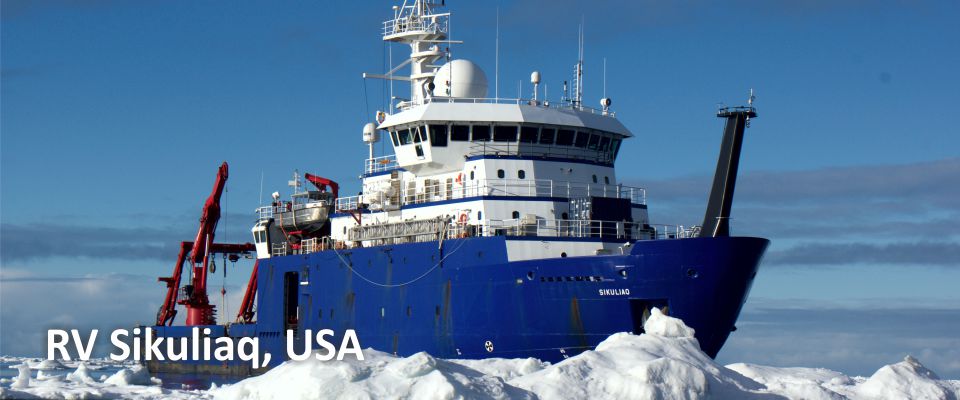Operator: University of Alaska Fairbanks (partner UAF/CFOS)
Country: United States
Vessel Type: Multipurpose Research Vessel with Polar Class 5 enhancement
Ice Class: Polar Class 5
Operational Area: North Pacific and Arctic regions
Endurance: 45 days
Science berths: 24
Length: 261 feet (79.6 meters)
Berths offered in ARICE: 6

Features:
RV Sikuliaq allows researchers to collect sediment samples directly from the seafloor, to host remotely operated vehicles, use a flexible suite of winches to raise and lower scientific equipment, and to conduct surveys throughout the water column and sea bottom using an extensive set of research instrumentation. The vessel design strives to have the lowest possible environmental impact, including a low underwater radiated noise signature for marine mammal and fisheries work. RV Sikuliaq has accommodations for up to 24 scientists and students at a time, including those with disabilities. The vessel is equipped with the following oceanographic sampling equipment: 150 KHz ADCP, 75 kHz ADCP, Centerboard, EK 60, EM 302 Multibeam, EM 710 Multibeam and a TOPAS PS18 Sub-bottom Profiler. There are two Climate Control Chambers and a Three Barnstead E-Pure Ultrapure Water Purification Systems located in the lab spaces.
Further information about PRV Polarstern:
Vessel website: https://www.sikuliaq.alaska.edu/
Technical characteristics: https://www.sikuliaq.alaska.edu/ops/?q=node/19
Scientific equipment/labs/instruments: https://www.sikuliaq.alaska.edu/ops/?q=node/25
General arrangement of Sikuliaq (here)
RV Sikuliaq operational areas:
Proposals to RV Sikuliaq will be accepted to perform research from 2018 to the end of 2021in the following geographic regions: Bering, Chukchi, and Beaufort Seas.
Modality of access under this proposal:
RV Sikuliaq will offer access equivalent to seven full days of research activities for a scientific team of up to six researchers. Applications must fit the overall operational plans for the vessel. Access to RV Sikuliaq is offered through the University-National Oceanographic Laboratory System (UNOLS) scheduling process.
Support offered under this proposal:
Support is guided by NSF and UNOLS standard protocols and may include:
- Food and accommodations,
- Lab space and power supply,
- Communication,
- Operational and logistic support,
- Basic data from meteorology, and navigational and hydrographical observatories as well as any other data being gathered during the expedition.

